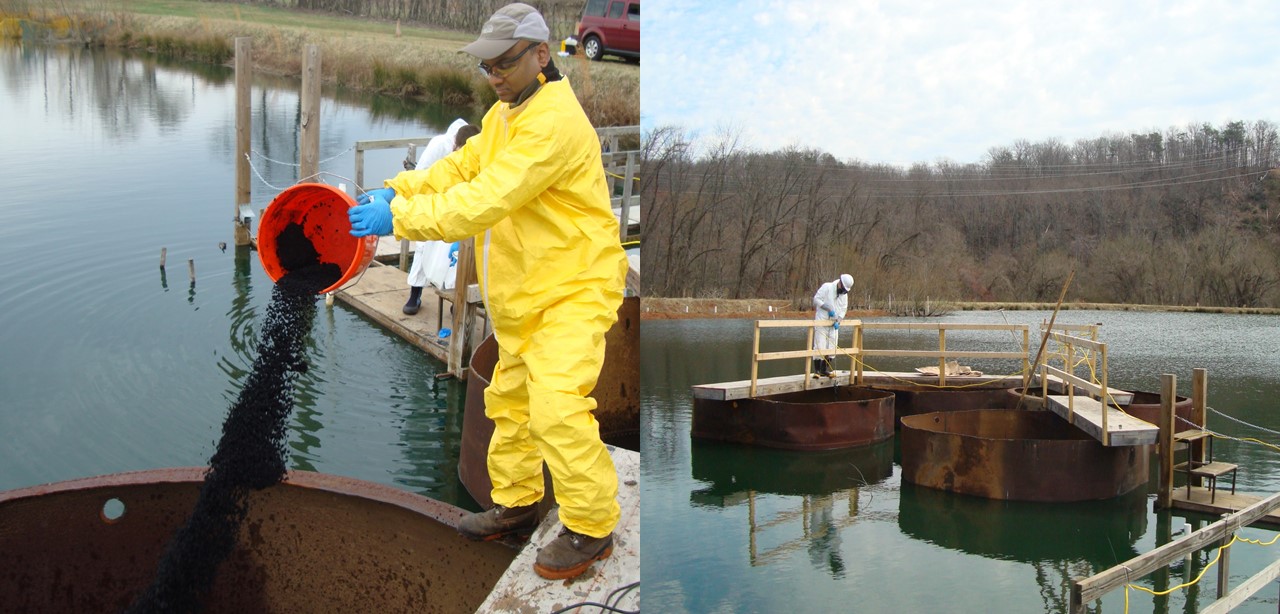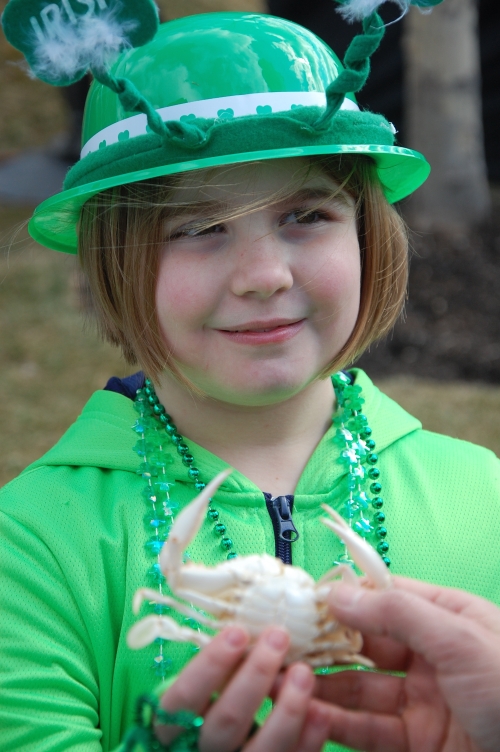Researchers from IMET and UMBC begin field testing bioremediation technology for removing PCBs in Altavista, VA

Altavista, VA (March 30, 2015)
After more than a decade of laboratory research on PCB dechlorination by Dr. Kevin Sowers at UMBC-IMET, and in-situ remediation of PCBs by Dr. Upal Ghosh in the UMBC Dept. of Chemical, Biochemical and Environmental Engineering, field tests have started, aimed at providing the first practical microbial in-situ treatment system for PCBs.
A large pilot scale demonstration was initiated on 17 March to test an innovative technology to clean up PCBs in a former wastewater treatment pond in Altavista VA. The technology, which employs naturally occurring PCB degrading microorganisms, addresses the current need for an environmentally sustainable and cost-effective alternative to current remediation technologies of dredging and capping to treat PCB impacted sediments throughout the U.S.
The most widely applied technologies for remediation of PCB-contaminated sediments are dredging and transfer to landfills or capping with clean sediments. In addition to being cost prohibitive for large areas of contamination in rivers, lakes and coastal sediments, these technologies are disruptive to environmentally sensitive areas such as marshes and wetlands. Recent in-situ studies have demonstrated the feasibility of PCB bioavailability reduction using activated carbon as an amendment. While these studies have been effective in reducing PCB bioavailability in sediments at sites with high concentrations of PCBs, a more desirable goal is to ultimately reduce the inventory of legacy PCBs in sediments while also reducing bioavailability to the food chain. Development of an in situ treatment system that enhances natural microbial activity, bioaugmentation, would provide a more cost-effective, and environmentally sustainable means of treating persistent organic pollutants such as PCBs. Such a system would eliminate high costs associated with dredging and removal and would have minimal negative impact on the environment since it employs communities of naturally occurring microorganisms.
This project is the culmination of more than a decade of laboratory research on PCB dechlorination by Dr. Kevin Sowers at UMBC-IMET, and in-situ remediation of PCBs by Dr. Upal Ghosh in the UMBC Dept. of Chemical, Biochemical and Environmental Engineering, that is now ready for synergistic implementation in the field. The innovative aspect of the technology is the development of a bioamended activated carbon pellet seeded with PCB- degrading microorganisms to reduce the concentration of polychlorinated biphenyls (PCBs) in sediments. Combining PCB dechlorinating and degrading microorganisms with SediMite(TM), a solid substrate which includes activated carbon particles, has been shown in the laboratory to achieve two major objectives: 1) rapid reduction of PCB levels that are bioavailable to the aquatic food chain through sequestration on the carbon surface, and 2) permanent reduction of total PCB concentrations in impacted sediments by microbial dechlorination and subsequent aerobic biodegradation of contaminants.
The field test is being conducted in a six-acre former wastewater treatment pond that contains PCB impacted sediments that resulted from decades old industrial waste streams released into the pond when it was active. A small in-situ study initiated in the pond in 2012 showed up to 80 % reduction in PCBs levels using this bioremediation technology. Based on these results the large-scale field test was begun in 10 foot diameter steel caissons placed in the pond by the Town of Altavista to demonstrate the efficacy of the technology for treating a large area. Successful validation of this technology in Altavista would provide the first tractable microbial in-situ treatment system for PCBs. In addition to lower cost, bioremediation would have a significantly reduced environmental impact compared with dredging by reducing the health risks associated with sediment disruption, reducing overall energy use and negating the requirement for extensive waste management and substantial habitat restoration.




